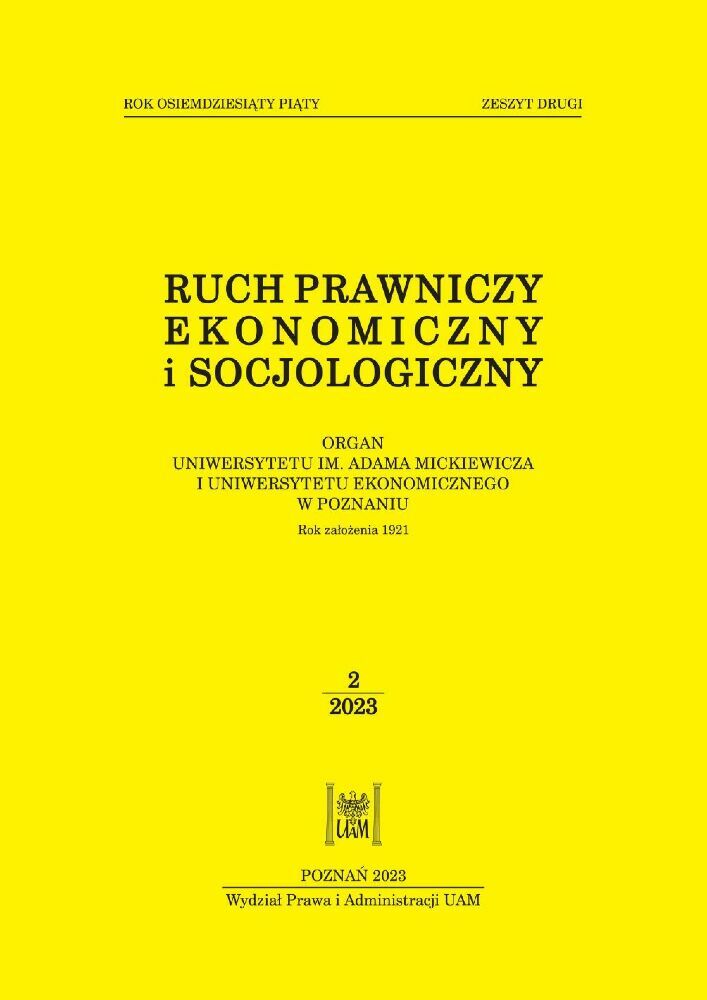Abstrakt
In the article I present the concept of the legal norm of conduct proposed by Zygmunt Ziembiński, situating it in the context of the structuralist research attitude – a methodological approach dominant in the Polish theory of law in the period when this key element of Ziembiński’s theory of law was created and shaped (the 1970s and 1980s). I illustrate individual fragments of the presented concept with selected quotations that are representative of the structuralist research approach. In my view, structuralism makes it possible to understand both the overwhelming influence of
Ziembiński’s concept of the norm on the Polish legal theory of the second half of the twentieth century, as well as to explain the causes of the controversies that this concept provoked in some representatives of Polish jurisprudence. I also draw attention to the evolution of the concept in question, including the weakening of its structuralist overtones in the last years of the Professor’s scientific work. An example that exemplifies this tendency is the concept of competence norm.
Bibliografia
Aarnio, A. (1984). Paradigms in Legal Dogmatics. In A. Peczenik (ed.), Theory of Legal Science. Dordrecht: D. Reidel Publishing Company. DOI: https://doi.org/10.1007/978-94-009-6481-5_4
Chomsky, N. (2002). Syntactic Structures. Berlin–New York: Mouton de Gruyter. DOI: https://doi.org/10.1515/9783110218329
Czepita, S. (1988). Koncepcje teoretycznoprawne Czesława Znamierowskiego [Czesław Znamierowski’s Concepts in Legal Theory]. Poznań: Wydawnictwo Naukowe UAM.
Czepita, S. (1996). Reguły konstytutywne a zagadnienia prawoznawstwa [Constitutive Rules and Issues of Jurisprudence]. Szczecin: Uniwersytet Szczeciński.
Leszczyński, J. (2010). O niezmienności sposobu uprawiania dogmatyki prawa [On the immutability of practicing legal dogmatics]. Studia Prawno-Ekonomiczne 81: 115–129.
Longchamps, F. (1960). Uwagi o używaniu pojęć w naukach prawnych [Remarks on the use of terms in legal science]. Warszawa–Wrocław: Zeszyty Naukowe. Nauki Społeczne 27(7): 11–19.
Longchamps, F. (1968). Współczesne kierunki w nauce prawa administracyjnego na zachodzie Europy [Modern Trends in the Study of Administrative Law in Western Europe]. Wrocław: Ossolineum.
Lorini, G. (2010). Ontologia społeczna Czesława Znamierowskiego [Czesław Znamierowski’s social ontology]. Ruch Prawniczy, Ekonomiczny i Socjologiczny 72(4): 21–30. http://hdl.handle.net/10593/1218
Nowacki, J. (1988). Przepis prawny a norma prawna [Legal Provision and Legal Norm]. Katowice: Wydawnictwo Uniwersytetu Śląskiego.
Peczenik, A. (2003). Stan obecny teorii i filozofii prawa w krajach zachodnich [The current state of legal theory and philosophy of law in Western countries]. In J. Stelmach (ed.), Studia z filozofii prawa [Studies in the Philosophy of Law] (pp. 9–14). Kraków: Wydawnictwo Uniwersytetu Jagiellońskiego.
Rosner, K. (1987). Strukturalizm [Structuralism]. In Z. Cackowski, J. Kmita, K. Szaniawski, P. Smoczyński (eds.), Filozofia a nauka. Zarys encyklopedyczny [Philosophy and Science: An Encyclopaedic Outline]. Wrocław: Zakład Narodowy imienia Ossolińskich, Wydawnictwo Polskiej Akademii Nauk.
Schaff, A. (1983). Szkice o strukturalizmie [Sketches on Structuralism]. Warsaw: Książka i Wiedza.
Szpunar, A. (1993). Udzielenie pełnomocnictwa [Granting of power of attorney]. Przegląd Sądowy 9: 18–34.
Zgółka, T. (1987). Struktura [Structure]. In Z. Cackowski, J. Kmita, K. Szaniawski, P. Smoczyński (eds.), Filozofia a nauka. Zarys encyklopedyczny [Philosophy and Science: An Encyclopaedic Outline]. Wrocław: Zakład Narodowy imienia Ossolińskich, Wydawnictwo Polskiej Akademii Nauk.
Zieliński, M. (1979). Poznanie naukowe a poznanie sądowe [Scientific and Judicial Cognition]. Poznań: Wydawnictwo Naukowe UAM.
Zieliński, M. (1997). Dwa nurty pojmowania „kompetencji” [Two concepts of ‘competence’]. In H. Olszewski, B. Popowska (eds.), Gospodarka, administracja, samorząd [Economy, Administration, Local Government] (pp. 581–607). Poznań: Wydawnictwo Printer Zieliński, M., Ziembiński, Z. (1988). Uzasadnianie twierdzeń, ocen i norm w prawoznawstwie [Justification of Judgments, Evaluations, and Norms in Legal Studies]. Warszawa: PWN.
Zieliński, M., Ziembiński, Z. (1992). Dyrektywy i sposób ich wypowiadania [Directives and How They Are Expressed]. Warsaw: Polskie Towarzystwo Semiotyczne.
Ziembiński, Z. (1966). Logiczne podstawy prawoznawstwa [Logical Foundations of Jurisprudence]. Warsaw: Wydawnictwo Prawnicze.
Ziembiński, Z. (1969). Kompetencja i norma kompetencyjna. Ruch Prawniczy, Ekonomiczny i Socjologiczny 31(4): 23–41 [published in English as Competence and the competence norms. In M. Smolak, P. Kwiatkowski (eds.), Poznań School of Legal Theory (pp. 91–97). Leiden–Boston: Brill and Rodopi, 2020. DOI: https://doi.org/10.1163/9789004448445_7
Ziembiński, Z. (1974). Metodologiczne zagadnienia prawoznawstwa [Methodological Issues of Jurisprudence]. Warszawa: PWN.
Ziembiński, Z. (1980). Problemy podstawowe prawoznawstwa [Fundamental Problems of Jurisprudence]. Warsaw: Państwowe Wydawnictwo Naukowe
Ziembiński, Z. (1983). Szkice z metodologii szczegółowych nauk prawnych [On the Methodology of the Particular Legal Sciences]. Warsaw–Poznań: Państwowe Wydawnictwo Naukowe.
Ziembiński, Z. (1991). O zawiłościach związanych z pojmowaniem kompetencji [On the On intricacies of interpreting competence]. Państwo i Prawo 46(4): 14–24.
Znamierowski, C. (1934). Podstawowe pojęcia teorii prawa [Fundamental Concepts of Legal Theory]. Part 1: Układ prawny i norma prawna [Legal System and Legal Norm]. Poznań: Górski i Tetzlaw.
Licencja
Prawa autorskie (c) 2023 WPiA UAM

Utwór dostępny jest na licencji Creative Commons Uznanie autorstwa 4.0 Międzynarodowe.





